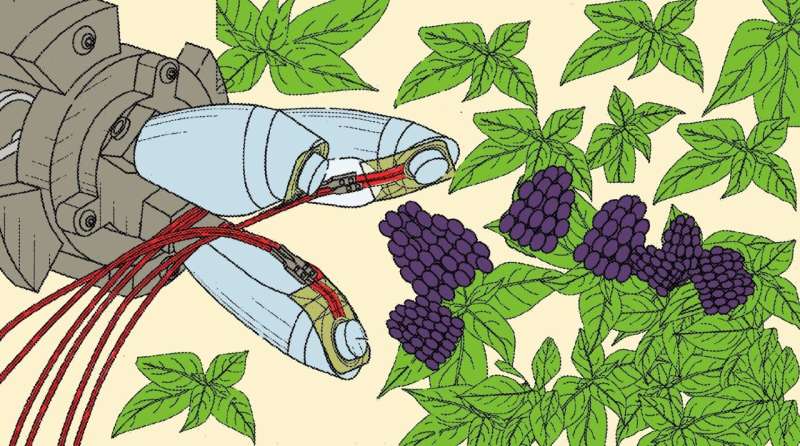
Fresh, frozen and processed berries are a multi-billion-dollar business in America. In Arkansas alone, fresh-market blackberries contribute $24.3 million each year to the state’s economy. But these delicate blackberries sold in clamshells at supermarkets must be picked by hand, and farm labor has been limited in recent years. A new berry-picking robot gripper developed at the U of A could give growers a high-tech replacement for limited labor availability.
The U.S patent was issued in April to the U of A for the invention “Soft Robotic Gripper for Berry Harvesting.” Technology Ventures, part of the Division of Research and Innovation, secured the patent.
The device was developed by Anthony Gunderman, at the time a Ph.D. student and now an assistant professor in U of A’s Department of Mechanical Engineering, with Yue Chen, a former U of A professor now at Georgia Tech, and Jeremy Collins, then a U of A undergraduate engineering student.
Inspired by nature
The robotic gripper has three “fingers,” each made of a soft, pliable material. When a “tendon”—in this case a guitar string—is pulled, the fingers retract.
Building robots from pliable materials is known as soft robotics, an approach first used in the 1960s. When designing soft robots, developers often look to nature for models, a process known as biomimicry. For the berry-picking hand, the researchers were inspired by the design of a tulip.
“I was inspired by the way a tulip flower opens and closes when the sunlight hits it,” Gunderman said.
On the tip of each finger is a force sensor, which makes sure the gripper can pluck the berry without crushing it. Roughly handled blackberries can be damaged at harvest or turn red after harvest, a condition called red drupelet reversion. Both are undesirable attributes for consumers. The USDA will also reject fresh blackberries with too much damage or too many red drupelets.
To determine the force needed to pick blackberries without damage, the engineers worked with Andrea Myers, then a graduate student, and Renee Threlfall, an associate professor in food science with the Arkansas Agricultural Experiment Station, the research arm of the U of A System’s statewide Division of Agriculture.
The team attached sensors to the fingertips of experienced blackberry pickers and measured how much force they applied while harvesting a berry.
Before the robot can be deployed on farms, the computer vision and positioning technologies that would let it find and reach for berries on the plant still need to be developed.
Today, heartier fruits like blueberries and pears are commonly harvested by machines. And rougher automated harvesting machines are used for blackberries that will be frozen or processed.
Better than a human
The human hand can adapt to many tasks. But Gunderman thinks one day the robotic hand could be better at picking blackberries.
“When we’re talking about one specific task, it is certainly the case that you could design something that is better than the human hand for that one specific task,” he said.
The robotic gripper could also be more consistent than human workers.
“Depending on if you have a brand-new hand harvester or someone who’s been doing it for decades, you will get vastly different berry quality,” Gunderman said.
The gripper could also be used to pick other soft fruits, such as raspberries.
The robotic gripper was tested on a range of objects, from hard items like a jar of pears and a can of beans to soft, flexible objects like a bag of potato chips and a T-shirt. The soft gripper, Gunderman said, might also be a tool for people with limited mobility due to injury or age.
Provided by
University of Arkansas
Citation:
Robot hand could harvest blackberries better than humans (2025, July 21)
retrieved 21 July 2025
from https://phys.org/news/2025-07-robot-harvest-blackberries-humans.html
This document is subject to copyright. Apart from any fair dealing for the purpose of private study or research, no
part may be reproduced without the written permission. The content is provided for information purposes only.
